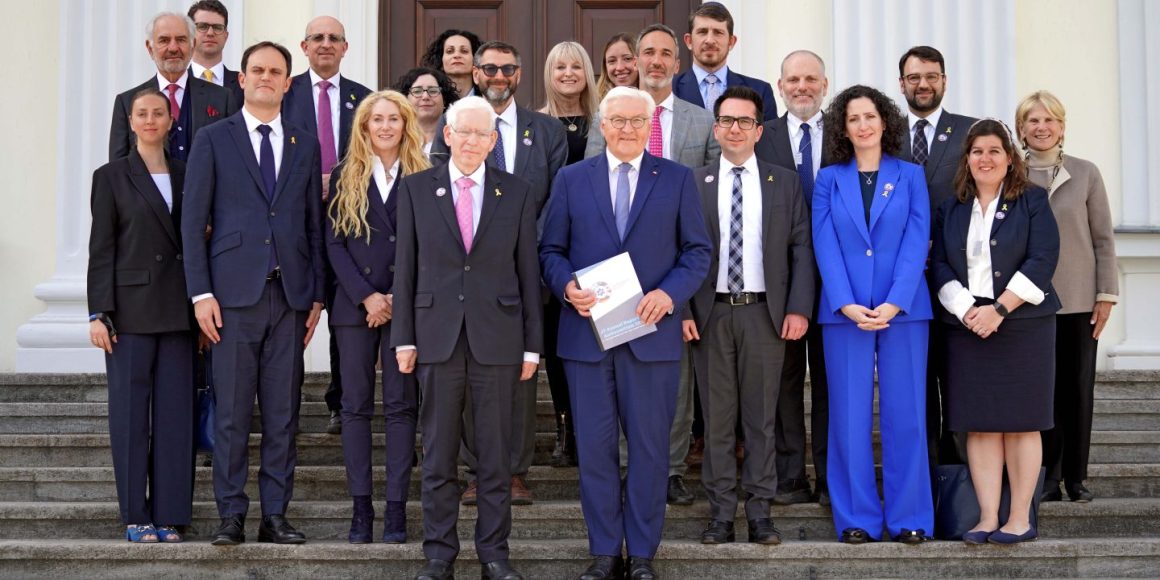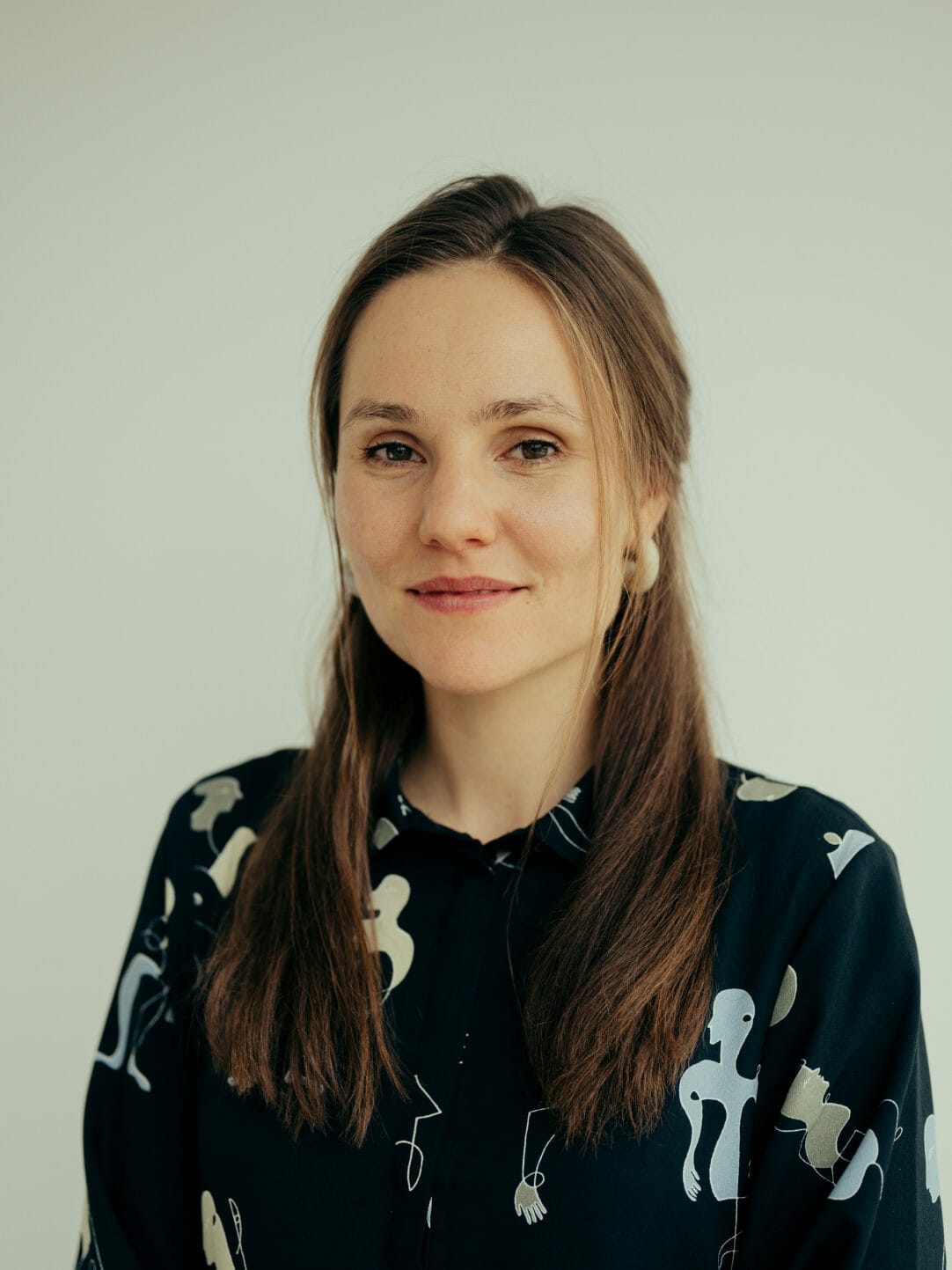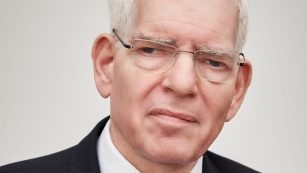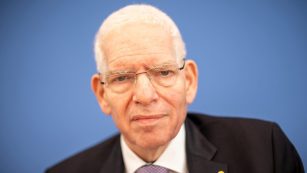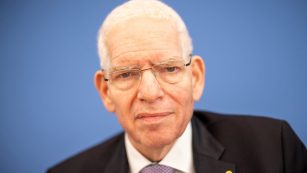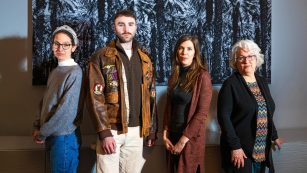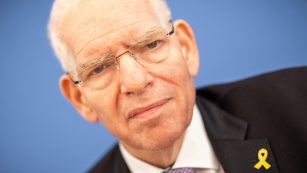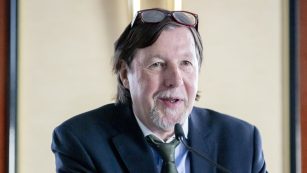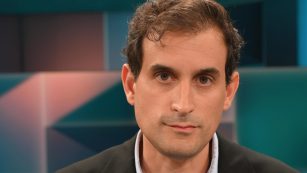This spring, wildflowers are fighting their way through the gravel where the barracks of the concentration camp once stood. »We told the gardeners to leave them«, says Astrid Ley, Deputy Director of the Sachsenhausen Memorial. The people listening to her nod. »I think it’s good. There are always signs of hope, even here«, says one woman.
The people Astrid Ley is guiding through the former camp today are no ordinary visitors. They are representatives from the seven largest diaspora communities: Jews from Australia, Argentina, Britain, Canada, France, Germany and the U.S.. Even though they come from far away, almost everyone has ancestors who survived the Shoah or fell victim to it - a grandfather from Bochum, a grandmother from Poland.
For the delegates of J7, the International Taskforce Against Antisemitism, the visit to Sachsenhausen is not a necessary reminder, but an announcement: »We are still here!«, they shout into a mobile phone camera. It is the start of their visit to Berlin, exactly 80 years after the Allies’ victory over Nazi Germany.
»Shoah education« is Central Subject
»Not only in Germany, but all over the world, we have to recognize that the memory of this time is fading and at the same time antisemitism is on the rise«, said Josef Schuster, President of the Central Council of Jews, in the run-up to the conference. Schuster welcomed the delegates from seven nations last week as host. He has taken over the chairmanship of the J7 this year. »Shoah education« was identified as the main subject.
»In Germany, we are experiencing a growing indifference towards the culture of remembrance, which goes as far as relativizing the Shoah, even in parliaments«, Schuster began the press conference held in front of international journalists at Leo Baeck House, the Central Council’s HQ, on Wednesday of last week. A large part of the young generation in Germany knew little about this time, Schuster warned. »We are observing similar developments in all J7 countries.« He said he was therefore glad that this strong task force exists to combat this development.
The J7 was founded in August 2023. Even then, shortly before October 7th, the diaspora communities observed a worrying rise in antisemitism worldwide. Jewish and umbrella organizations from the seven nations with the largest communities outside Israel decided at the time to work together to combat antisemitism in future and to prepare for a new global wave of hatred towards Jews.
Global Threat, Global Response
»This vision has unfortunately come true after October 7th«, said Marina Rosenberg, Vice President for International Affairs at the Anti-Defamation League (ADL), during the press conference. »We know the threat is global and the response must be global.«
This is also confirmed by the first J7 report, which was presented at the press conference. Since October 7th, 2023, it has documented what Jewish communities around the world have experienced first-hand. »Between 2021 and 2023, antisemitic incidents increased by 227 per cent in the U.S., 185 per cent in France, 83 per cent in Canada, 82 per cent in the U.K. and 75 per cent in Germany. In Australia, we saw an unimaginable increase of 317 per cent in 2024 alone,« said Rosenberg.
If you look at the number of incidents per Jewish person in the individual countries, the picture becomes even more alarming: In Germany, there were more than 38 antisemitic incidents per 1000 Jewish inhabitants in 2023. »That is the highest number among the J7 countries this year. The victims are your neighbours, your friends, your colleagues,« she said, addressing the journalists who had come to the Leo Baeck House from local and international media.
Most Frightening Examples
»In all seven countries, we are seeing the same disturbing patterns: more violence, targeted attacks on synagogues and Jewish schools, rampant online hatred towards Jews who are increasingly hiding their identity out of fear, and the failure of governments to hold perpetrators accountable«, Rosenberg stated. The representatives from the other countries then gave insights into the most frightening examples of this violence in their communities.
Alex Ryvchin from Australia reported he had experienced that even in a peaceful and successful multicultural society, antisemitism could gain a foothold and fundamentally change the character of a country within a few months. Chants glorifying violence on the streets, slogans and boycott campaigns escalated within a short period of time, including attacks on synagogues and Jewish homes - including his former home - and even kindergartens.
His colleague from Canada, Noah Shack, brought in a similarly frightening list of attacks: »Schools were shot at, synagogues were firebombed. Jewish shops were vandalized, people were harassed and attacked on the street.«
Stronger Regulations
Mauro Bernstein from Argentina emphasised that they cooperate closely with the government in Buenos Aires. In addition, they take legal action and run prevention programs, particularly against antisemitism online. However, the number of antisemitic incidents in Argentina had also risen alarmingly. The representatives from the other countries provided insights into the most alarming examples of violence in their communities.
His French colleague, Yonathan Arfi, President of the French umbrella organisation CRIF (Conseil Représentatif des Institutions Juives de France), added that there was also an urgent need for stronger regulations against online hate in France. However, the number of violent physical attacks has also exploded following the Hamas massacre. The case of a twelve-year-old girl who was raped by a group of her peers because she is Jewish is particularly harrowing. »We know that this antisemitism has its origins in radical Islam, in hatred of Israel, but also in conspiracy theories«, Arfi explained.
Adrian Cohen from the U.K. emphasised that, in addition to the particularly brutal cases, underlying antisemitism is also leaving its mark on communities: »People’s confidence in their work and in their environment is dwindling, and complaints about discrimination, isolation and exclusion are on the rise. There is also an unspoken boycott of Jewish institutions in the arts and cultural sector, and the opportunity for Jews to get involved in certain areas of society is being restricted.«
Harrowing experiences
Finally, Betsy Cohen, the incoming chair of the Conference of Presidents of Major American Jewish Organisations, took the floor. She used the moment to summarize each of the harrowing experiences: »This first J7 report is more than just a collection of grim statistics. It is a moral reckoning. It proves to us what our communities have already felt: that the pain of 7 October still reverberates and that antisemitism is on the rise on every continent.«
The report confirms »that all our communities face similar challenges«. However, there is also an opportunity to learn from each other. Her colleague cited a practical example from Australia, where antisemites had published the names and addresses of Jewish artists and creatives in a »mass doxing«. As the Americans had already campaigned for the passing of laws against doxing, this experience could be used to initiate similar processes in Australia. »The development of joint strategies and approaches was extremely helpful«, Alex Ryvchin said.
Betsy Cohen added that they wanted to stand up together for the Jewish people, speak with one voice and help ensure a safer, more inclusive world for future generations. The meeting in Berlin, 80 years after the end of the Holocaust, was no coincidence: »The words never again are not only spoken, but lived by each of us every day.«

